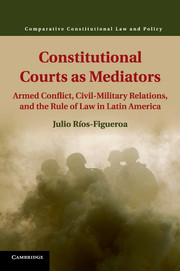 Constitutional Courts as Mediators
Constitutional Courts as Mediators Book contents
- Frontmatter
- Dedication
- Contents
- List of Figures
- List of Tables
- Acknowledgments
- 1 Constitutional Courts and the Armed Forces
- 2 A Theory of Constitutional Courts as Mediators
- 3 Constitutional Jurisprudence on Military Autonomy in Colombia, 1958–2013
- 4 Constitutional Jurisprudence on Military Autonomy in Peru, 1979–2013
- 5 Constitutional Jurisprudence on Military Autonomy in Mexico, 1917–2013
- 6 Judicial Regulation of the Use of Force in Colombia, Peru, and Mexico
- 7 Constitutional Courts as Mediators beyond Latin America
- 8 Constitutional Courts and Democratic Confl ict Solving
- References
- Index
8 - Constitutional Courts and Democratic Confl ict Solving
Published online by Cambridge University Press: 05 May 2016
- Frontmatter
- Dedication
- Contents
- List of Figures
- List of Tables
- Acknowledgments
- 1 Constitutional Courts and the Armed Forces
- 2 A Theory of Constitutional Courts as Mediators
- 3 Constitutional Jurisprudence on Military Autonomy in Colombia, 1958–2013
- 4 Constitutional Jurisprudence on Military Autonomy in Peru, 1979–2013
- 5 Constitutional Jurisprudence on Military Autonomy in Mexico, 1917–2013
- 6 Judicial Regulation of the Use of Force in Colombia, Peru, and Mexico
- 7 Constitutional Courts as Mediators beyond Latin America
- 8 Constitutional Courts and Democratic Confl ict Solving
- References
- Index
Summary
Ordinary courts help solve conflicts. Constitutional courts do more than help in solving specific conflicts: their authoritative interpretation of the constitution is a means for adapting existing institutions and rules of the political game to changing conditions. Constitutional jurisprudence also helps political actors and regular citizens learn what the constitutional framework and principles are and to adapt their views and preferences accordingly. I have advanced an informational theory of constitutional review arguing that to the extent that the source of a conflict is uncertainty, constitutional courts acting as third-party mediators in conflict resolution can obtain and credibly transmit through jurisprudence conflict-relevant information to the parties, which reduces the uncertainly underlying their conflict. The theory rests on the interrelation of three features of constitutional courts: access (so that judges obtain conflict-relevant information), powers of judicial review (to transform the received information into jurisprudence), and independence (to credibly transmit the information). Independence is a necessary condition: when courts are not independent they tend to act as delegates of whoever controls them. But when courts are independent their jurisprudence approaches the mediator model of conflict resolution to the extent that they are more accessible and have greater powers of judicial review.
Existing theories of the role of courts in producing desired outcomes emphasize the importance of judicial independence. In the theory advanced in this book independence is a necessary condition for courts to produce informative, mediator-like jurisprudence. But of most critical importance is access to constitutional justice. When people cannot get their cases to the court, not only is justice denied to them but also the court does not get enough information about the underlying causes that drive particular parties to file or contest a suit. The court then tends to solve that particular case, with a narrower approach than if it had had the opportunity to learn that the specific case at hand is part of a larger social or political or economic problem that is producing grievances among parties. Of course, judges as persons may have an idea of those underlying socioeconomic factors, depending on their personal characteristics and their degree of political information or interest in politics.
- Type
- Chapter
- Information
- Constitutional Courts as MediatorsArmed Conflict, Civil-Military Relations, and the Rule of Law in Latin America, pp. 200 - 206Publisher: Cambridge University PressPrint publication year: 2016


